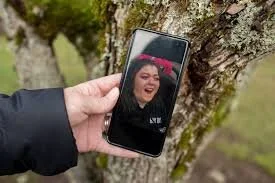Full Life, Full Code, and Disability Bias
Image of hand holding a cell phone with a picture of Sarah McSweeney, dark hair, pale skin, open mouth, smiling, pink wheelchair bar behind her head
Sarah McSweeney was a 45-year-old Oregon City woman who was nonspeaking, quadriplegic, and fed through a tube.
She went to the hospital with a fever this past March, when the coronavirus came to prominence in the US, and died there. While negative for COVID19, she died three weeks later from asphyxiation pneumonia, which can happen when one’s feeding tube is improperly cleaned. One could say she really died due to another plague: the unconscious — and unconscionable — disability bias from the medical professionals charged with her care, who appeared incredulous that her quality of life would merit her desire to live.
According to her caregivers, Sarah was vivacious, funny, and loved. She listened to country music, had met Kenny Chesney twice, and enjoyed going to the mall in her hot pink wheelchair, getting her hair and makeup done — “girly things.” She wanted to work as a greeter at one of the stores near the group home where she lived, and was going through the process of acquiring a speech-generating device that she could operate using her eyes, as she could not use her fingers (or toes) to push buttons on a device.
The hospital care team pushed for her caregivers to change the legal document that indicated Full Code — do everything to save her life — to one of DNR, or Do Not Resuscitate. When informed that Sarah led a full life, the doctors pushed back: “This girl?” said one. “Can she walk, and talk?” said another, walking his index and middle finger in the air.
The disability bias is one that our ableist society doles out in spades — especially as we place such high value on verbal ability as a measure of cognition. Most of us believe that, if a person cannot speak, or struggles to do so – due to communication impairments such as stuttering, or loss of language post-stroke, or autism — that they must not be able to think, plan, or make decisions. That they are unintelligent. That they need to be infantilized, disregarded, and excluded from conversations about their own lives.
I use my privilege as a neurotypical person to advocate for those who cannot speak, and/or for whom social interaction constitutes a major deficit. This is what drives my work: that everyone needs to be able to have their voices heard — especially when it involves them. They deserve workplace accommodations, a communication proxy, and advocacy. They don’t deserve to be overlooked in the workplace, at school, or in their communities.
Everyone, regardless of verbal and intellectual ability, deserves to be seen and heard. We all want to have a say in our own care during a medical emergency (if we are not unconscious, comatose or catatonic — that’s where the advanced directive comes in). We all want to provide input on how we’re educated and what learning modalities work best for us.
While autism is a serious developmental disorder that impairs the ability to communicate and interact due to impacts on the nervous system, anyone can become disabled at any time. It’s the great equalizer. Anyone can be robbed you of their voice at any time from disease, stroke, car accident, gunshot wound — the list is long. And if it happened to you — wouldn’t you want to have a say in your own care? If you or your child were or are on the autism spectrum, wouldn’t/don’t you want the social barriers to be curtailed so that you or your child’s dreams could be realized?

